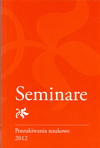Działalność kompozytorska, naukowa i pedagogiczna Alicji Gronau w świetle biografii kompozytorki
The compositional, academic and pedagogical activities of Alicja Gronau in the light of her biography
Author(s): Marcin T. ŁukaszewskiSubject(s): History
Published by: Towarzystwo Naukowe Franciszka Salezego (TNFS)
Keywords: Marian Borkowski; Szabolcs Esztényi Alicja Gronau; Witold Rudziński; Improvisation; Polish women composers; Eurhythmics; compositional technique; music theory
Summary/Abstract: ‘High-calibre artists who are women’ – was the motto of an exhibition ‘Polish women composers 1816-1939’, which was held in Katowice in 2003. In the nineteenth century, professional composers were almost all men. Only a handful of women earned a reputation for accomplishments that went beyond amateur music-making. In the twentieth century, women made their presence felt in various forms of artistic activity, including music. Grażyna Bacewicz (1909-1969) is regarded as the patron of Polish women composers of the last century. She achieved worldwide reputation and ranks among the most outstanding 20th-century Polish composers, alongside Karol Szymanowski, Witold Lutosławski and Krzysztof Penderecki. Alicja Gronau, born in 1957, belongs to the most interesting Polish women composers. She began her musical education in 1971 in one of Warsaw’s secondary music schools, attending eurhythmics classes with Barbara Turska and studying piano improvisation with Szabolcs Esztényi, a Hungarian pianist and composer domiciled in Poland. It was thanks to Esztényi that improvisation charted the development of her career. Having graduated from secondary school, Gronau enrolled at the Fryderyk Chopin Music Academy in Warsaw, where she gained two diplomas: in music theory (the class of Witold Rudziński) and subsequently in composition (under the guidance of Marian Borkowski). During her studies, she worked closely at the Experimental Eurhythmics Workshop at her Alma Mater. She participated in the Workshop’s study visit to Hungary, the 14th Congress of the International Society for Music Education in Warsaw and in the eurhythmics courses organized by the E. Jaques-Dalcroze Institute in Geneva and Zakopane (Poland). Gronau stresses that eurhythmics and improvisation played a highly important role in the development of her compositional workshop. Gronau’s first composition, written during her studies with Marian Borkowski, was Przenikanie (Penetration) for solo clarinet (1981). It was followed by Mironczarnie I for a cappella vocal septet (1982), Gioco per voci e batteria (1982), Open for clarinet, viola and horn (1983), Flowing for orchestra (1984), String Quartet No. 1 (1984) and Versioni for 24 performers (1984). In these works, she employed a wide range of techniques. She developed her skills at numerous master courses, including those in Kazimierz Dolny-on-the-Vistula. She is a prizewinner of many composers’ competitions, as well as grants and state distinctions (see – the final fragment of the Polish version of the article). Her creative interests proceeded from a freely-elaborated dodecaphony to controlled aleatory and a search for her own, individual musical idiom. One of her latest major compositions is Poemat – Requiem for orchestra. Her entire output includes several dozen compositions for various performance forces and of diverse stylistic and expressive features. (see the list of compositions at the end of the Polish version of the article). Gronau has als
Journal: Seminare. Poszukiwania naukowe
- Issue Year: 32/2012
- Issue No: 2
- Page Range: 253-266
- Page Count: 14
- Language: Polish

